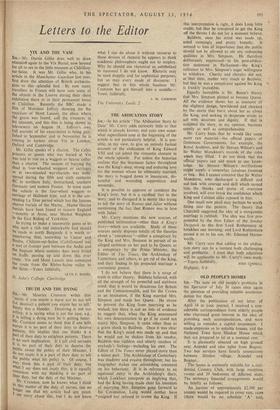THE ABDICATION STORY
SIR,—In his article ' The Abdication Story to Date ' Mr. Curry adds curiously little to that
which is already known; and your own some- what supercilious note at the beginning of the article is not particularly helpful. It is pos-
sible, in my view, to give an entirely factual account ,of the abdication of King Edward VIII and yet admit the romantic clement in the whole, episode. For unless the historian realises that the dominant factor throughout was the King's deep, strong and enduring love for the woman whom he ultimately married, the story is bogged down in inaccurate, dis- tasteful and wounding supposition and innuendo.
It is possible to approve or condemn the King's love; but it is a cardinal fact in the story; and to disregard it is surely like trying to tell the story of Romeo and. Juliet without mentioning the fac;. that Romeo was in love with Juliet.
Mr. Curry mentions the new sources of published information—other than A King's Story—which are available. Study of these sources surely disposes totally of the theories about a ' conspiracy '—either a conspiracy by the King and Mrs. Simpson in pursuit of an alleged ambition on her part to be Queen; or a conspiracy by the Prime Minister, the Editor of The Times, the Archbishop of Canterbury and others, to get rid of the King, and their finding in his projected marriage a convenient pretext.
I do not believe that there is a scrap of truth in either theory. Baldwin believed, with all the strength of his powerful and stubborn mind. that it would be disastrous for Britain and the Commonwealth, and for the Crown as an institution, if the King married Mrs. Simpson and made her Queen. He strove to prevent the King from marrying as he wished; but there is not an iota of evidence to suggest that, when the King announced his own determination to go if he could not marry Mrs. Simpson, it came other than as a grave shock to Baldwin. Once it was clear that the King's mind was made up and that he would not be shaken from his resolve, Baldwin was ruthless and utterly careless of anybody's feelings—including his own. The Editor of The Times never played more than a minor part. The Archbishop of Canterbury was shadowy and evasive throughout; but his biographer makes one astonishing comment on his behaviour. It is in reference to an equivocal entry in the Archbishop's diary, which Lockhart interprets as implying that, had the King having made clear his intention of marrying Mrs. Simpson gone forward to his Coronation, Lang would neither have • resigned nor refused to crown the King. If this interpretation is right, it does Lang little credit; but that he conspired to get the King off the throne I do not for a moment believe.
Baldwin, once his mind was made up, acted cunningly and pretty brutally. It seemed to him of importance that the public should not be allowed to see any redeeming qualities in Mrs. Simpson. He therefore deliberately suppressed—in his post-abdica- tion statement in Parliament—the King's reference to Mrs. Simpson's eager willingness to withdraw. Charity and chivalry did not, at that time, matter very much to Baldwin; but that he was a conspirator against his King is frankly incredible.
Equally incredible is Mr. Bocca's theory that Mrs. Simpson plotted to become Queen. All the evidence shows her as innocent of the slightest design, bewildered and shocked by the storm that burst about her as about the King, and seeking in desperate straits to act with decorum and dignity. If that is accepted the story, in my opinion, becomes seemly as well as comprehensible.
Mr. Curry hints that he would like some more raw material—the official papers of Dominion Governments, for example, the Royal Archives, and Sir Horace Wilson's and Sir Walter Monckton's records of the roles which they filled. I do not think that the official papers can add much to our know- ledge. Sir Horace Wilson's recollections might supply a somewhat fabulous footnote or two. But I cannot conceive that Sir Walter Monckton, who discharged a difficult and sad task with courage and skill which earned him the thanks and praise of everyone involved, will ever break the confidence which King and Cabinet alike reposed in him. One small new pied may perhaps be worth fitting into the pattern. The theory that Churchill suggested the idea of a morganatic
marriage is rubbish. The idea was first pro- pounded by the then Editor of the Sunday
Despatch to the first Lord Rothermere at breakfast one morning; and Lord Rothermere passed it on to his son, Mr. Edmond Harms- worth.
Mr. Curry says that adding to the abdica- tion story can be a venture both challenging and profitable. I trust that both adjectives will be applicable to Mr. Curry's own work. —Yours faithfully, Highgate, N.6
JOHN C9NNELL


































 Previous page
Previous page